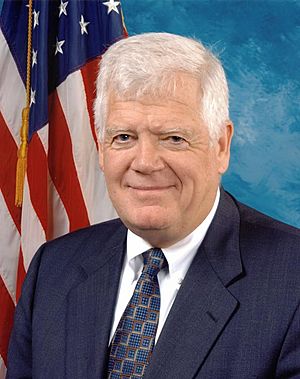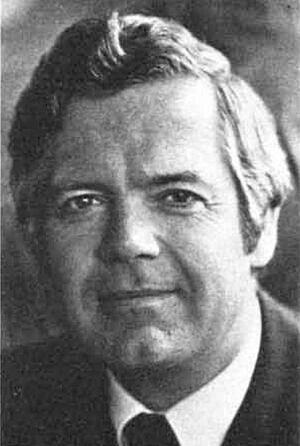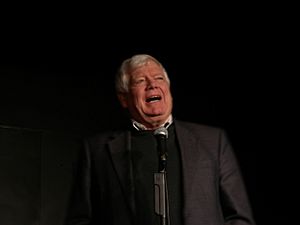Jim McDermott facts for kids
Quick facts for kids
Jim McDermott
|
|
|---|---|
 |
|
| Member of the U.S. House of Representatives from Washington's 7th district |
|
| In office January 3, 1989 – January 3, 2017 |
|
| Preceded by | Mike Lowry |
| Succeeded by | Pramila Jayapal |
| Chair of the House Ethics Committee | |
| In office January 3, 1993 – January 3, 1995 |
|
| Preceded by | Louis Stokes |
| Succeeded by | Nancy Johnson |
| Member of the Washington Senate from the 43rd district |
|
| In office January 13, 1975 – July 24, 1987 |
|
| Preceded by | Jonathan Whetzel |
| Succeeded by | Janice Niemi |
| Member of the Washington House of Representatives from the 43rd district |
|
| In office January 11, 1971 – January 8, 1973 |
|
| Preceded by | Jonathan Whetzel |
| Succeeded by | Jeff Douthwaite |
| Personal details | |
| Born |
James Adelbert McDermott
December 28, 1936 Chicago, Illinois, U.S. |
| Political party | Democratic |
| Spouses |
Virginia Beattie
(div. 1989)Therese Hansen
(m. 1997; div. 2012) |
| Children | 2 |
| Education | Wheaton College (BS) University of Illinois, Chicago (MD) |
| Military service | |
| Allegiance | |
| Branch/service | |
| Years of service | 1968–1970 |
| Rank | Lieutenant Commander |
| Unit | Medical Corps |
| Battles/wars | Vietnam War |
James Adelbert McDermott (born December 28, 1936) is an American politician and a doctor who specializes in mental health (a psychiatrist). He served as a U.S. representative for Washington's 7th district from 1989 to 2017. He is a member of the Democratic Party. This district covers most of Seattle and nearby towns like Vashon Island, Tukwila, and Edmonds.
McDermott was part of important committees in the House of Representatives. He was on the House Ways and Means Committee and was a member of the House Progressive Caucus. He also led the House Ethics Committee for a time. He decided not to run for re-election in 2016.
Contents
- Early Life and Education
- Starting a Political Career
- Serving in the U.S. House of Representatives
- Becoming a Representative
- Key Laws and Actions
- Helping People with AIDS
- Protecting Water Sources
- Trip to Iraq in 2002
- Supporting African Trade
- Protecting Women from Violence
- Pledge of Allegiance Discussion
- Ethics Committee Investigation
- Helping Foster Children
- Supporting Workers and Homeowners
- Conflict Minerals Law
- Fairness for Same-Sex Couples
- Online Gambling Regulation
- Committee Roles
- Groups He Joined
- Personal Life
- See also
Early Life and Education
Jim McDermott was born in Chicago, Illinois, on December 28, 1936. He was the first person in his family to go to college. He earned a degree from Wheaton College, Illinois. Then, he went to medical school at the University of Illinois College of Medicine in Chicago, becoming a doctor in 1963.
After his medical training, he specialized in child psychiatry in Seattle. He then served in the United States Navy Medical Corps. He worked as a psychiatrist in California during the Vietnam War.
Starting a Political Career
In 1970, McDermott began his political journey. He was elected to the Washington state legislature as a representative. He later ran for Governor of Washington in 1972 but did not win.
In 1974, he was elected to the state senate. He was re-elected three times. During this time, he helped create the Washington State Basic Health Plan. This was the first program of its kind in the country. It offered health insurance to people who were unemployed or had low incomes.
McDermott ran for governor two more times, in 1980 and 1984. He won the Democratic primary in 1980 but lost the general election. In 1984, he campaigned with an "Apple agenda." This stood for Affordable health care, Promotion of jobs, Protection of the environment, Life with hope, and excellence in Education. He lost the primary election that year.
In 1987, McDermott took a break from politics. He worked as a medical officer in Zaire (now the Democratic Republic of the Congo). He provided mental health services to U.S. government workers and Peace Corps members in Africa.
Serving in the U.S. House of Representatives
Becoming a Representative
In 1988, a seat in the U.S. House of Representatives became available. Jim McDermott returned from Africa to run for it. He won easily with 71 percent of the votes. He was re-elected 13 times after that. His district was very supportive of him. He often won by a large margin, even when other Democrats faced tough elections. For example, in 1994, he won with 75% of the vote. He did not seek re-election in 2016.
Key Laws and Actions
McDermott worked on many important laws during his time in Congress.
Helping People with AIDS
In his first term, McDermott supported the AIDS Housing Opportunity Act of 1990. This law helped state and local governments provide housing for people with AIDS and their families. The program, called HOPWA, has grown to help many people.
Protecting Water Sources
He also worked on the Cedar River Watershed Land Exchange Act of 1992. This law helped the city of Seattle better control its main water source. This allowed for better planning for the future.
Trip to Iraq in 2002
In 2002, McDermott visited Iraq with other representatives. They met with Iraqi officials and citizens. McDermott was criticized by some for this trip. He had predicted that President George W. Bush would "mislead the American public" about reasons for war. He also said no WMD (weapons of mass destruction) would be found in Iraq. His supporters felt he was proven right later.
Supporting African Trade
The African Growth and Opportunity Act of 2004 was another important law he supported. This act lowered taxes on goods from many African countries. It helped create jobs and brought money to some of the poorest nations in Africa. In 2007, the King of Lesotho even honored McDermott for his work on this act.
Protecting Women from Violence
He helped pass the Violence Against Women and Justice Department Reauthorization Act of 2005. This law made privacy stronger for people receiving help. It also updated the law to include cyberstalking as a crime.
Pledge of Allegiance Discussion
On April 28, 2004, McDermott led the House in saying the Pledge of Allegiance. He left out the words "under God." These words were added to the Pledge in 1954, the year he graduated high school. He later said he used the version he learned as a child.
Ethics Committee Investigation
In 2004, the House Ethics Committee looked into McDermott's actions. This was about a conversation that was recorded without permission in 1997. The conversation involved other politicians. McDermott shared this recording with news organizations.
The Ethics Committee later formally criticized McDermott in 2006. They said his actions were "not consistent with the spirit of the committee." He was ordered to pay legal fees and damages related to this incident.
Helping Foster Children
The Fostering Connections to Success and Increasing Adoptions Act of 2008 was a big change for the American foster care system. This law helped foster children in many ways. It extended federal payments for foster care until children were 21. It also provided support for relatives caring for foster children.
Supporting Workers and Homeowners
McDermott helped oversee laws to extend unemployment benefits during the economic downturn that started in 2008. He also supported the Worker, Home-ownership, and Business Assistance Act of 2009. This act aimed to create jobs and help people buy homes.
Conflict Minerals Law
He worked on the Conflict Minerals Trade Act of 2010. This law requires companies to check that certain minerals in their products do not come from mines that fund civil wars. This helps save lives by cutting off money to armed groups.
Fairness for Same-Sex Couples
McDermott sponsored a bill to make taxes fairer for married same-sex couples and domestic partners. This bill also aimed to give federal employees' domestic partners the same health care benefits as married spouses.
Online Gambling Regulation
In 2011, McDermott introduced a bill about online gambling. This bill would create a tax system if online gambling became fully legal and regulated in the United States.
Committee Roles
McDermott was a member of several important committees:
- Committee on Ways and Means
- Subcommittee on Health
- Committee on the Budget
He also served on the Ethics Committee.
Groups He Joined
McDermott was part of many groups in Congress. He helped lead these groups:
- Congressional HIV/AIDS Caucus
- Congressional Progressive Caucus
- Congressional Kidney Caucus
- Afterschool Caucuses
Personal Life
Jim McDermott has been married twice. He has two children and three grandchildren. He lives in Seattle, but also has a home in France.
See also
- Physicians in US Congress
 | Kyle Baker |
 | Joseph Yoakum |
 | Laura Wheeler Waring |
 | Henry Ossawa Tanner |



